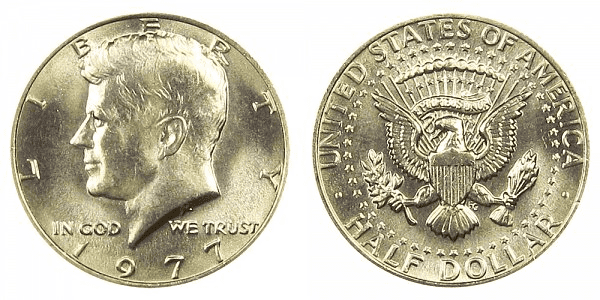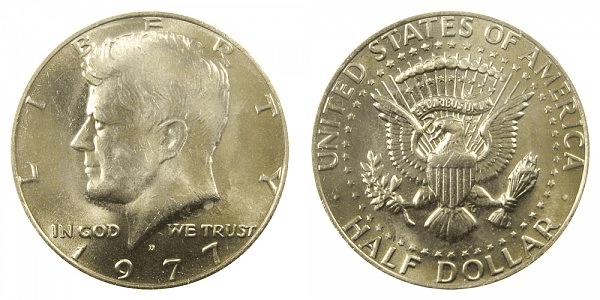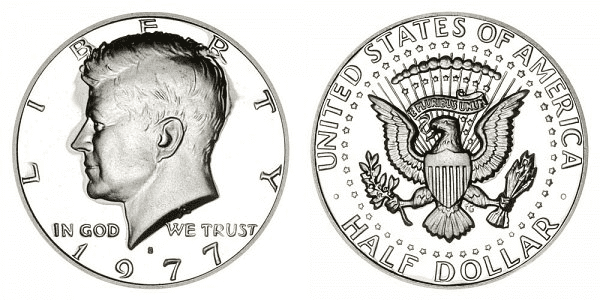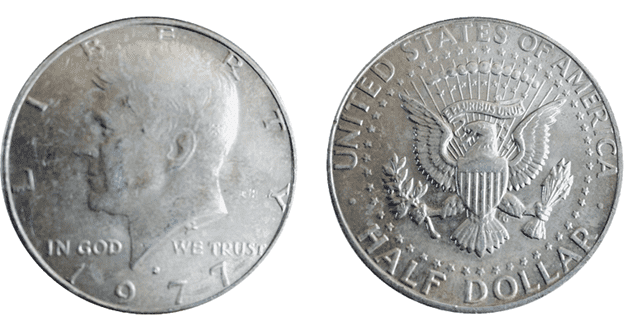What Is A 1977 Kennedy Half Dollar Made Of?
The Kennedy Half Dollar, one of the most well-known and cherished coins honouring one of the most revered US presidents—John F. Kennedy—is preserved by both collectors and non-collectors.
When Congress decided to produce a new half-dollar design to honour John F. Kennedy, the US Mint selected sculptors Gilroy Roberts and Frank Gasparro to complete the piece. The final artwork was uncomplicated and centred on honouring Kennedy and the nation he served. In 1964, the first Kennedy half dollar was struck; it is still in use today.
John F. Kennedy is depicted as a bust on the coin’s obverse, looking to the left. “LIBERTY” is written at the top of the coin, and “IN GOD WE TRUST” is written at Kennedy’s neck’s base. At the bottom of the obverse, the mintage date is centred.
On its chest, the American bald eagle’s coat of arms is visible, and its wings are extended widely. The eagle’s talons are holding a collection of arrows and an olive branch. The coin’s top is centred with “UNITED STATES OF AMERICA,” while its bottom is centred with “HALF DOLLAR.”
Kennedy in 1972 The composition of half dollars is 8.33% nickel and 91.67% copper. The coin’s edge is 2.15 mm thick, 30.6 mm in diameter, and contains 150 reeds. The coin has a reeded edge and 11.34 g in weight.
The release of the penny made 1977 an especially active year. Voyager 1 and 2 signalled a new era in NASA’s space research, the Star Wars series and Saturday Night Fever were made into movies, and the Atari 2600 launched the contemporary home gaming system.
Is A 1977 Kennedy Half Dollar Silver?
1977 Kennedy Half Dollars have no silver content as they are comprised of 8.33% nickel and 91.67% copper. There have been one or two super rare error coins which have seen 1977 half dollars being struck on silver planchets, but these are so rare that getting your hands on one would be like winning the lottery.
Just in case though, you can check if your coin is silver by weighing it. Normal 1977 half dollars weight 11.34g, so any fluctuations from this could indicate a coin with a different metal content than usual.
1977 Half Dollar Varieties
1977 P Half Dollar (No Mint Mark)
Year: 1977
Face Value: $0.50
Composition: 8.33% nickel and 91.67% copper
Weight: 11.34 g
Diameter: 30.6 mm
Thickness: 2.15 mm
Edge: 150 Reeds
Mint in: Philadelphia (Coins minted in Philadelphia have no mint mark)
Mint Quantity: 43,598,000

1977 D Half Dollar
Year: 1977
Face Value: $0.50
Composition: 8.33% nickel and 91.67% copper
Weight: 11.34 g
Diameter: 30.6 mm
Thickness: 2.15 mm
Edge: 150 Reeds
Mint in: Denver
Mint Quantity: 31,449,106

1977 S Half Dollar
Year: 1977
Face Value: $0.50
Composition: 8.33% nickel and 91.67% copper
Weight: 11.34 g
Diameter: 30.6 mm
Thickness: 2.15 mm
Edge: 150 Reeds
Mint in: San Francisco
Mint Quantity: 3,251,152

List of errors
1977-D half dollar on silver planchet

All 31,449,106 coins in the 1977 Kennedy half-dollar mintage were supposed to be struck on composition blanks covered in copper-nickel. The Denver Mint received unknown quantities of silver-copper clad planchets from the San Francisco Mint, along with copper-nickel clad planchets, according to specialists on error coins.
The San Francisco Mint produced circulation-grade copper-nickel-clad issues as well as 40% silver 1776–1976 Kennedy and Bicentennial half dollars for collector collections.
mistaken coin dealer In Fred Weinberg’s estimation, just a dozen 1977-D Kennedy half dollars with a silver-copper clad (40% silver) surface are known to exist.
How Much Is A 1977 Kennedy Half Dollar Worth Today?
Kennedy half dollars produced between 1971 and 2014 have a melt value of only $0.1003423, which is significantly less than their face value, as they contain no precious metal. There’s little value in the 1977 Kennedy half dollar outside of its incredibly rare error example. In pristine condition 1977-P and 1977-D half dollars are worth around $2.28, while a 1977-S proof coin is worth around $5.70.
How Does The Grading System Work?
The Sheldon Scale is used by numismatists to provide a numerical value to coins. The Sheldon Scale goes from poor (P-1) to perfect mint state (P-1) (MS-70). Coins were originally evaluated using words to reflect their condition (Good, Fair, Excellent, Etc.). Unfortunately, coin collectors and dealers had different ideas about what each of these terms represent.
Professional numismatists joined together in the 1970s and established CoinGrading standards. These numismatists now assign grades at key places on the seventy-point scale, using the most regularly utilized numeric points in conjunction with the original adjective grade. The following are the most common coin grades:
-
-
- (P-1) Poor – Indistinguishable and probably damaged; if used, must have a date and mintmark; otherwise, rather battered.
- (FR-2) Fair – Nearly smooth, but without the damage that a coin graded Poor often possesses. The coin must have enough detail to be identified.
- (G-4) Fair – Inscriptions have merged into the rims in some areas, and important elements have been mostly erased.
- (VG-8) Very Good- A little weathered, but all of the primary design elements are visible, albeit faintly. There is little if any, central detail left.
- (F-12) Good – The item is very worn, yet the wear is even, and the overall design details stand out clearly. Rims are almost completely isolated from the field.
- (VF-20) Very Fine – Moderately weathered, with some finer features still visible. The motto or all letters of LIBERTY are readable. Both sides of the coin have entire rims that are separated from the field.
- (EF-40) Extremely Fine – Gently used; all gadgets are visible, and the most important ones are bold. The finer details are bold and clear, however, light wear may be seen.
- (AU-50) Uncirculated – Slight evidence of wear on the coin’s design’s high points; may have contact marks; eye appeal should be adequate.
- (AU-58) Uncirculated Choice – Slight traces of wear, no severe contact marks, almost full mint shine, and great eye appeal.
- (MS-60) Mint State Basal – Strictly uncirculated; no indication of wear on the coin’s highest points, but an unsightly coin with reduced luster, visible contact marks, hairlines, and other flaws.
- (MS-63) Mint State Acceptable – Uncirculated, but with contact scratches and nicks, little reduced shine, but otherwise appealing appearance. The strike is weak to average.
- (MS-65) Mint State Choice – Uncirculated with great mint shine, very little contact blemishes, and exceptional eye appeal. The strike is unusually severe.
- (MS-68) Mint State Premium Quality – Uncirculated with superb luster, no obvious contact marks to the naked eye, and exceptional eye appeal. The strike is quick and appealing.
- (MS-69) Almost Perfect Mint State – Uncirculated with perfect brilliance, a sharp and appealing strike, and extremely good eye appeal. A near-perfect coin with minor imperfections in the planchet, strike, and contact markings (seen only under 8x magnification).
- (MS-70) Mint State Perfect – Under 8x magnification, there are no tiny imperfections discernible; the strike is crisp, and the coin is perfectly centered on a beautiful planchet. Rarely seen on a coin, this coin is bright and whole, with original luster and exceptional eye appeal.
-
Where To Buy Or Sell 1977 Half Dollars?
You can be somewhat confident while buying and selling 1977 half dollars at online auction sites like eBay and Etsy because they are (generally) such low-value coins. Of course, before you sell any 1977 half dollar be sure to check for any rare errors, as these coins should be authenticated and graded by a service like PGCS before they can be sold at auction or to a specialised dealer.
FAQs
Where is the mint mark on a 1977 Kennedy half dollar?
The mint mark on a Kennedy Half Dollars is found below Kennedy’s neck on the obverse side of the coin.
What is the value of 40% silver half dollar?
Silver Kennedy half dollars can have a value of between $5-10
What makes a 1977 half dollar rare?
The only well-known rarity seen in this year of the coin is when the coin has been struck on a silver planchet instead of a clad one.
